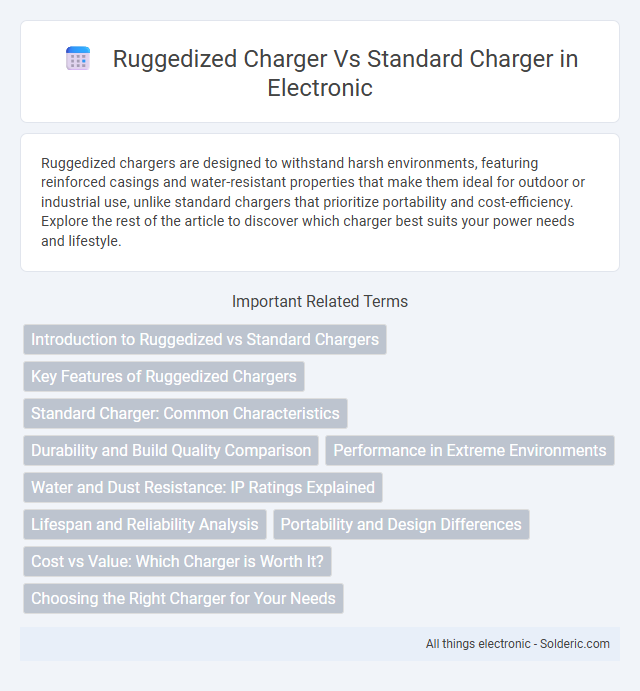Ruggedized chargers are designed to withstand harsh environments, featuring reinforced casings and water-resistant properties that make them ideal for outdoor or industrial use, unlike standard chargers that prioritize portability and cost-efficiency. Explore the rest of the article to discover which charger best suits your power needs and lifestyle.
Comparison Table
| Feature | Ruggedized Charger | Standard Charger |
|---|---|---|
| Durability | High impact resistance, shockproof, dust and water resistant (IP67/IP68) | Basic build, not resistant to shocks, dust, or water |
| Use Case | Outdoor, industrial, military, and harsh environments | Indoor, household, and office environments |
| Material | Reinforced casing, heavy-duty materials like rubber and metal | Plastic or standard lightweight materials |
| Price | Higher cost due to advanced protection features | Lower cost, mass-produced |
| Portability | Bulkier due to rugged design | Compact and lightweight |
| Charging Speed | Comparable to standard chargers, supports fast charging | Standard charging speeds, varies by model |
| Lifespan | Longer lifespan in harsh conditions | Shorter lifespan if exposed to rough use |
Introduction to Ruggedized vs Standard Chargers
Ruggedized chargers are designed with reinforced materials and waterproof, dustproof, and shockproof features to withstand harsh environments, unlike standard chargers built for everyday indoor use. They provide reliable power delivery in industrial settings, outdoor adventures, and military applications where durability is critical. Standard chargers, typically lightweight and cost-effective, lack the resilience of ruggedized models and are best suited for controlled, low-risk environments.
Key Features of Ruggedized Chargers
Ruggedized chargers feature reinforced housings, shockproof and waterproof designs, and enhanced durability to withstand harsh environments, unlike standard chargers which are typically built for indoor or light use. These chargers often include advanced safety mechanisms such as overvoltage protection, temperature control, and dust resistance, ensuring reliable performance in industrial or outdoor settings. Their compatibility with a wide range of devices and ability to operate under extreme temperatures make ruggedized chargers ideal for fieldwork and heavy-duty applications.
Standard Charger: Common Characteristics
Standard chargers typically feature a compact design with lightweight materials suited for everyday indoor use and are optimized for consistent voltage and current output compatible with a wide range of consumer electronics. They often include basic safety features such as overcurrent protection and short-circuit prevention but lack specialized resistance to environmental factors like water, dust, or physical impact. Standard chargers prioritize efficiency and convenience over durability, making them ideal for controlled environments rather than extreme or rugged conditions.
Durability and Build Quality Comparison
Ruggedized chargers feature reinforced casings made from impact-resistant materials such as rubber and heavy-duty plastic, offering superior protection against drops, dust, and water compared to standard chargers with basic plastic shells. Their build quality often includes sealed ports and enhanced insulation to withstand harsh environments found in industrial or outdoor settings, whereas standard chargers are primarily designed for indoor use with less emphasis on resilience. This durability ensures ruggedized chargers maintain functionality and safety over extended periods under extreme conditions, significantly outperforming standard models in longevity and reliability.
Performance in Extreme Environments
Ruggedized chargers are engineered with reinforced materials and sealed components to withstand dust, water, temperature extremes, and shock, ensuring reliable performance in harsh outdoor and industrial environments. Standard chargers typically lack these protective features, making them susceptible to damage or failure under extreme conditions such as heavy rain, freezing temperatures, or high vibration. Devices powered by ruggedized chargers maintain consistent charging speeds and safety standards even in demanding settings, offering superior durability and operational reliability compared to standard chargers.
Water and Dust Resistance: IP Ratings Explained
Ruggedized chargers offer superior water and dust resistance compared to standard chargers, often featuring IP ratings such as IP67 or IP68, which guarantee protection against dust ingress and immersion in water up to specified depths and durations. Standard chargers typically have lower or no IP ratings, making them susceptible to damage from exposure to moisture and particles. Understanding IP ratings is crucial when choosing a charger for harsh environments, as higher ratings ensure enhanced durability and reliability under extreme conditions.
Lifespan and Reliability Analysis
Ruggedized chargers feature reinforced casings and enhanced internal components, resulting in a lifespan that often exceeds 5 years under harsh environmental conditions, compared to standard chargers which typically last 1-3 years due to susceptibility to physical damage and wear. Their reliability is significantly higher with advanced surge protection, waterproofing, and dust resistance certifications like IP67 or IP68, minimizing failure rates in industrial or outdoor settings. Standard chargers lack these durability features, leading to frequent replacements and lower operational uptime in demanding environments.
Portability and Design Differences
Ruggedized chargers feature reinforced housings, shockproof materials, and waterproof seals that enhance durability but increase weight and size compared to standard chargers. Standard chargers prioritize compactness and lightweight design, making them highly portable but less resistant to harsh environments. Your choice depends on whether you need robust protection for outdoor or industrial use or prefer easy transport for everyday charging needs.
Cost vs Value: Which Charger is Worth It?
Ruggedized chargers often come with a higher upfront cost compared to standard chargers due to their durable build and enhanced features such as water resistance, shockproof design, and extended lifespan. Your investment in a ruggedized charger provides significant value for environments requiring reliable power solutions under harsh conditions, reducing the need for frequent replacements. Standard chargers may be more cost-effective for everyday use but lack the durability and longevity offered by ruggedized models, making the latter worth the extra expense for demanding applications.
Choosing the Right Charger for Your Needs
Ruggedized chargers are designed with reinforced casings and waterproof features, making them ideal for outdoor or industrial environments where durability is critical. Standard chargers, while typically more affordable and compact, lack these protective elements and are best suited for everyday indoor use. Selecting the right charger depends on your usage context, device compatibility, and whether your environment demands enhanced protection against drops, dust, and moisture.
Ruggedized charger vs standard charger Infographic

 solderic.com
solderic.com